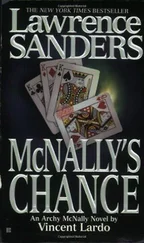Lawrence Sanders - The 1st Deadly Sin
Здесь есть возможность читать онлайн «Lawrence Sanders - The 1st Deadly Sin» весь текст электронной книги совершенно бесплатно (целиком полную версию без сокращений). В некоторых случаях можно слушать аудио, скачать через торрент в формате fb2 и присутствует краткое содержание. Жанр: Полицейский детектив, на английском языке. Описание произведения, (предисловие) а так же отзывы посетителей доступны на портале библиотеки ЛибКат.
- Название:The 1st Deadly Sin
- Автор:
- Жанр:
- Год:неизвестен
- ISBN:нет данных
- Рейтинг книги:5 / 5. Голосов: 1
-
Избранное:Добавить в избранное
- Отзывы:
-
Ваша оценка:
- 100
- 1
- 2
- 3
- 4
- 5
The 1st Deadly Sin: краткое содержание, описание и аннотация
Предлагаем к чтению аннотацию, описание, краткое содержание или предисловие (зависит от того, что написал сам автор книги «The 1st Deadly Sin»). Если вы не нашли необходимую информацию о книге — напишите в комментариях, мы постараемся отыскать её.
The 1st Deadly Sin — читать онлайн бесплатно полную книгу (весь текст) целиком
Ниже представлен текст книги, разбитый по страницам. Система сохранения места последней прочитанной страницы, позволяет с удобством читать онлайн бесплатно книгу «The 1st Deadly Sin», без необходимости каждый раз заново искать на чём Вы остановились. Поставьте закладку, и сможете в любой момент перейти на страницу, на которой закончили чтение.
Интервал:
Закладка:
“Yes,” he said. “Too bad.”
“I must be going,” she said abruptly, and marched into the bedroom to retrieve her cape.
“I’ll see you home,” he said eagerly.
“No. That won’t be necessary. I’ll take a cab.”
“At least let me come down to call a cab for you.”
“Please don’t.”
“I want to see you again. May I call you?”
“Yes.”
She was out the door and gone almost before he was aware of it. The smell of snuffed candles and old smoke lingered in the room.
He turned out the lights and sat a long time in darkness, pondering what she had said. Something in him responded to it. He began to glimpse the final picture that might be assembled from the bits and pieces of his thought and behavior that had, until now, puzzled him so. That final picture shocked him, but he was neither frightened nor dismayed.
Once, late in the previous summer, he had been admiring his naked, newly slender and tanned body in the bedroom mirror. Only the nightlight was on. His flesh was sheened with its dim, rosy glow.
He noted how strange and somehow exciting the gold chain of his wrist watch looked against his skin. There was something there…A week later he purchased a women’s belt, made of heavy, gold-plated links. He specified a chain adjustable to all sizes, and then had it gift-wrapped for reasons he could not comprehend.
Now, only hours after he had first met Celia Montfort, after she had slept in his bed, after she had listened to him and spoken to him, he stood naked again before the bedroom mirror, the room illuminated only by the caressing nightlight. About his wrist was the gold chain of his watch, and around his slim waist was the linked belt.
He stared, fascinated. Chained, he touched himself.
4
Javis-bircham Publications, Inc. owned the office building, and occupied the top fifteen floors, on 46th Street west of Ninth Avenue. The building had been erected in the late 1930s, and was designed in the massive, pyramidal style of the period, with trim and decoration modeled after that of Rockefeller Center.
Javis-Bircham published trade magazines, textbooks, and technical journals. When Daniel Blank was hired six years previously, the company was publishing 129 different periodicals relating to the chemical industry, oil and petroleum, engineering, business management, automotive, machine tools, and aviation. In recent years magazines had been added on automation, computer technology, industrial pollution, oceanography, space exploration, and a consumer monthly on research and development. Also, a technical book club had been started, and the corporation was currently exploring the possibilities of short, weekly newsletters in fields covered by its monthly and bi-monthly trade magazines. Javis-Bircham had been listed as number 216 in Fortune Magazine’s most recent list of America’s 500 largest corporations. It had gone public in 1951 and its stock, after a 3–1 split in 1962, showed a 20-fold increase in its Big Board price.
Daniel Blank had been hired as Assistant Circulation Manager. His previous jobs had been as Subscription Fulfillment Manager and Circulation Manager on consumer periodicals. The three magazines on which he had worked prior to his employment at Javis-Bircham had since died. Blank, who saw what was happening, had survived, in a better job, at a salary he would have considered a hopeless dream ten years ago.
His first reaction to the circulation set-up at Javis-Bircham was unequivocal. “It’s a fucked-up mess,” he told his wife.
Blank’s immediate superior was the Circulation Manager, a beefy, genial man named Robert White, called “Bob” by everyone, including secretaries and mailroom boys. This was, Blank thought, a measure of the man.
White had been at Javis-Bircham for 25 years and had surrounded himself with a staff of more than 50 males and females who seemed, to Blank, all “old women” who smelled of lavender and whiskey sours, arrived late for work, and were continually taking up office collections for birthdays, deaths, marriages, and retirements.
The main duty of the Circulation Department was to supply to the Production Department “print-run estimates”: the number of copies of each magazine that should be printed to insure maximum profit for Javis-Bircham. The magazines might be weeklies, semi-monthlies, monthlies, quarterlies, semi-annuals or annuals. They might be given away to a managerial-level readership or sold by subscription. Some were even available to the general public on newsstands. Most of the magazines earned their way by advertising revenue. Some carried no advertising at all, but were of such a specialized nature that they sold solely on the value of their editorial content.
Estimating the “press run” of each magazine for maximum profitably was an incredibly complex task. Past and potential circulation of each periodical had to be considered, current and projected advertising revenue, share of general overhead, costs of actual printing-quality of paper, desired process, four-color plates, etc.-costs of mailing and distributing, editorial budget (including personnel), publicity and public relations campaigns, etc., etc.
At the time Daniel Blank joined the organization, this bewildering job of “print-run estimation” seemed to be done “by guess and by God.” Happy Bob White’s staff of “old women” fed him information, laughing a great deal during their conversations with him. Then, when a recommendation was due, White would sit at his desk, humming, with an ancient slide rule in his hands, and within an hour or so would send his estimate to the Production Department.
Daniel Blank saw immediately that there were so many variables involved that the system screamed for computerization. His experience with computers was minimal; on previous jobs he had been involved mostly with relatively simple data-processing machines.
He therefore enrolled for a six months’ night course in “The Triumph of the Computer.” Two years after starting work at Javis-Bircham, he presented to Bob White a 30-page carefully organized and cogently reasoned prospectus on the advantages of a computerized Circulation Department.
White took it home over the weekend to read. He returned it to Blank on Monday morning. Pages were marked with brown rings from coffee cups, and one page had been crinkled and almost obliterated by a spilled drink.
White took Daniel to lunch and, smiling, explained why Blank’s plan wouldn’t do. It wouldn’t do at all.
“You obviously put a lot of work and thought into it,” White said, “but you’re forgetting the personalities involved. The people. My God, Dan, I have lunch with the editors and advertising managers of those magazines almost every day They’re my friends. They all have plans for their books: a article that might get a lot of publicity and boost circulation a new hot-shot advertising salesman who might boost revenu way over the same month last year. I’ve got to consider a those personal things. The human factors involved. You can’t feed that into a computer.”
Daniel Blank nodded understandingly. An hour after they returned from lunch he had a clean copy of his prospectus on the desk of the Executive Vice President.
A month later the Circulation Department was shocked to learn that laughing Bob White had retired. Daniel Blank was appointed Circulation Director, a title he chose himself, and given a free hand.
Within a year all the “old women” were gone, Blank had surrounded himself with a young staff of pale technicians, and the cabinets of AMROK II occupied half the 30th floor of the Javis-Bircham Building. As Blank had predicted, not only did the computer and auxiliary data-processing machines handle all the problems of circulation-subscription fulfillment and print-run estimation-but they performed these tasks so swiftly that they could also be used for salary checks, personnel records, and pension programs. As a result, Javis-Bircham was able to dismiss more than 500 employees and, as Blank had carefully pointed out in his original prospectus, the annual leasing of the extremely expensive AMROK II resulted in an appreciable tax deduction.
Читать дальшеИнтервал:
Закладка:
Похожие книги на «The 1st Deadly Sin»
Представляем Вашему вниманию похожие книги на «The 1st Deadly Sin» списком для выбора. Мы отобрали схожую по названию и смыслу литературу в надежде предоставить читателям больше вариантов отыскать новые, интересные, ещё непрочитанные произведения.
Обсуждение, отзывы о книге «The 1st Deadly Sin» и просто собственные мнения читателей. Оставьте ваши комментарии, напишите, что Вы думаете о произведении, его смысле или главных героях. Укажите что конкретно понравилось, а что нет, и почему Вы так считаете.












